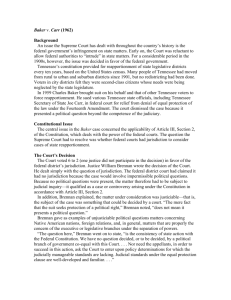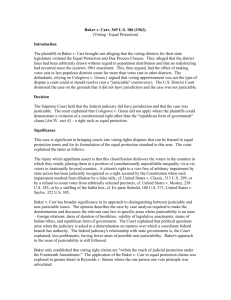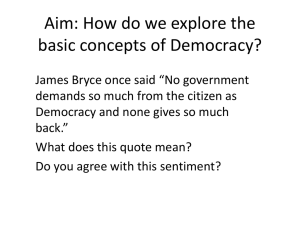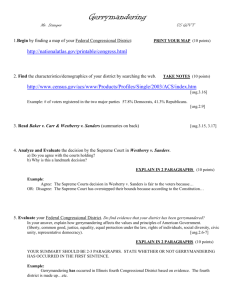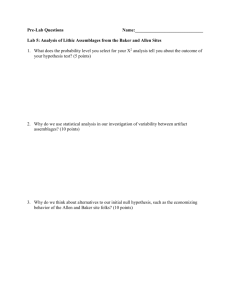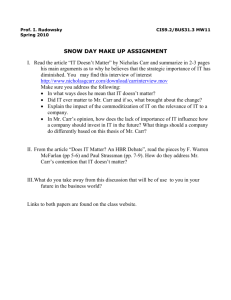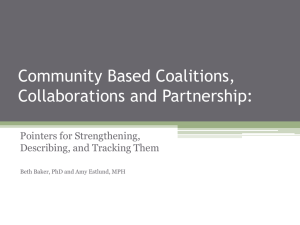26 Baker v. Carr (1962) Chief Justice Earl Warren (1943
advertisement
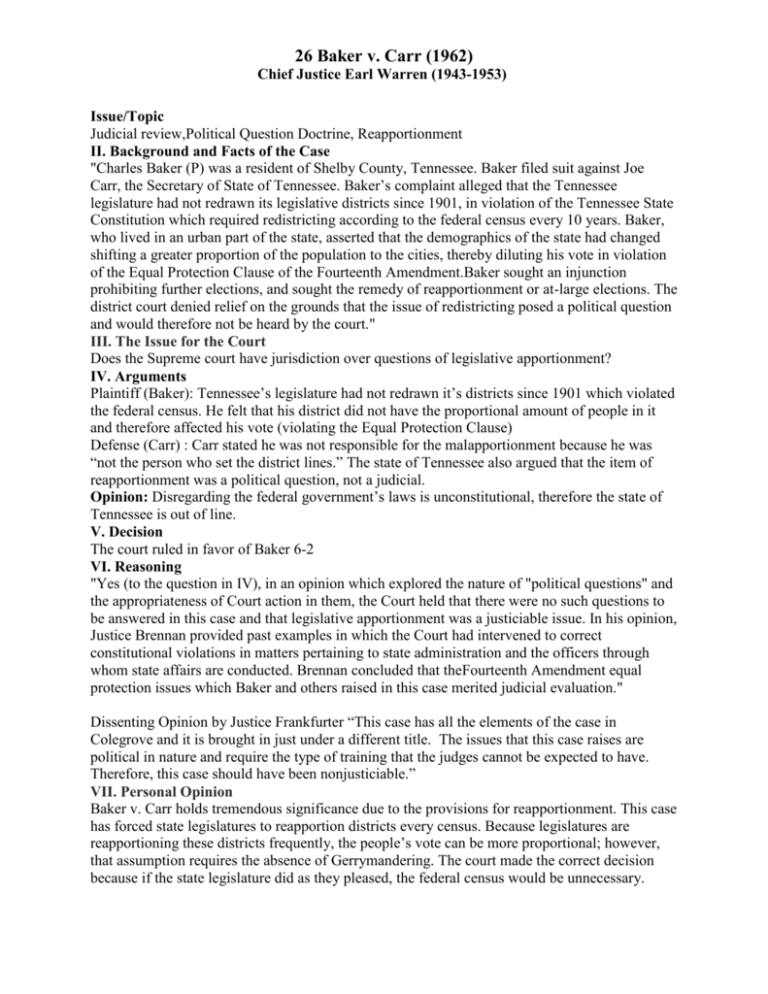
26 Baker v. Carr (1962) Chief Justice Earl Warren (1943-1953) Issue/Topic Judicial review,Political Question Doctrine, Reapportionment II. Background and Facts of the Case "Charles Baker (P) was a resident of Shelby County, Tennessee. Baker filed suit against Joe Carr, the Secretary of State of Tennessee. Baker’s complaint alleged that the Tennessee legislature had not redrawn its legislative districts since 1901, in violation of the Tennessee State Constitution which required redistricting according to the federal census every 10 years. Baker, who lived in an urban part of the state, asserted that the demographics of the state had changed shifting a greater proportion of the population to the cities, thereby diluting his vote in violation of the Equal Protection Clause of the Fourteenth Amendment.Baker sought an injunction prohibiting further elections, and sought the remedy of reapportionment or at-large elections. The district court denied relief on the grounds that the issue of redistricting posed a political question and would therefore not be heard by the court." III. The Issue for the Court Does the Supreme court have jurisdiction over questions of legislative apportionment? IV. Arguments Plaintiff (Baker): Tennessee’s legislature had not redrawn it’s districts since 1901 which violated the federal census. He felt that his district did not have the proportional amount of people in it and therefore affected his vote (violating the Equal Protection Clause) Defense (Carr) : Carr stated he was not responsible for the malapportionment because he was “not the person who set the district lines.” The state of Tennessee also argued that the item of reapportionment was a political question, not a judicial. Opinion: Disregarding the federal government’s laws is unconstitutional, therefore the state of Tennessee is out of line. V. Decision The court ruled in favor of Baker 6-2 VI. Reasoning "Yes (to the question in IV), in an opinion which explored the nature of "political questions" and the appropriateness of Court action in them, the Court held that there were no such questions to be answered in this case and that legislative apportionment was a justiciable issue. In his opinion, Justice Brennan provided past examples in which the Court had intervened to correct constitutional violations in matters pertaining to state administration and the officers through whom state affairs are conducted. Brennan concluded that theFourteenth Amendment equal protection issues which Baker and others raised in this case merited judicial evaluation." Dissenting Opinion by Justice Frankfurter “This case has all the elements of the case in Colegrove and it is brought in just under a different title. The issues that this case raises are political in nature and require the type of training that the judges cannot be expected to have. Therefore, this case should have been nonjusticiable.” VII. Personal Opinion Baker v. Carr holds tremendous significance due to the provisions for reapportionment. This case has forced state legislatures to reapportion districts every census. Because legislatures are reapportioning these districts frequently, the people’s vote can be more proportional; however, that assumption requires the absence of Gerrymandering. The court made the correct decision because if the state legislature did as they pleased, the federal census would be unnecessary. 26 Baker v. Carr (1962) Chief Justice Earl Warren (1943-1953) VIII. Historical Significance of the Case Case decided whether federal courts had the jurisdiction to rule on legislative reapportionment plans and according to Ajlambert “Baker v. Carr and subsequent cases fundamentally altered the nature of political representation in America, requiring not just Tennessee but nearly every state to redistrict during the 1960s, often several times.” Related cases Colegrove v. Green Reynolds v. Sims Wesberry v. Sanders IX. Citations "Baker v. Carr – Case Brief Summary." Lawnix - Law Resources and Legal Information. Web. 29 Apr. 2011. <http://www.lawnix.com/cases/baker-carr.html>. "Baker v. Carr | The Oyez Project at IIT Chicago-Kent College of Law." The Oyez Project at IIT Chicago-Kent College of Law | U.S. Supreme Court Oral Argument Recordings, Case Abstracts and More. Web. 21 Apr. 2011. <http://www.oyez.org/cases/1960-1969/1960/1960_6>. "Baker v. Carr." 4LawSchool.com: For Law, Pre-law Students and Legal Professionals. Web. 29 Apr. 2011. <http://www.4lawschool.com/conlaw/baker.shtml>.


